MLP to OGGConvert MLP to OGG, MLP to OGG Converter |
 |
| Home | Getting Started | Download | Buy Now! | Screen Shots | FAQ | Support | Contact |
OGG Video Converter converts MLP files to OGG format easily and quickly. The software is an ALL-IN-ONE audio converter that supports more than 100 audio and video files. OGG Video Converter supports batch conversion, and is full compatible with 32-bit and 64-bit Vista and Windows 7.
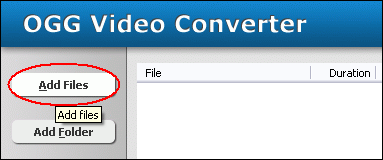 Click "Add Files" to choose MLP files and add to conversion list. 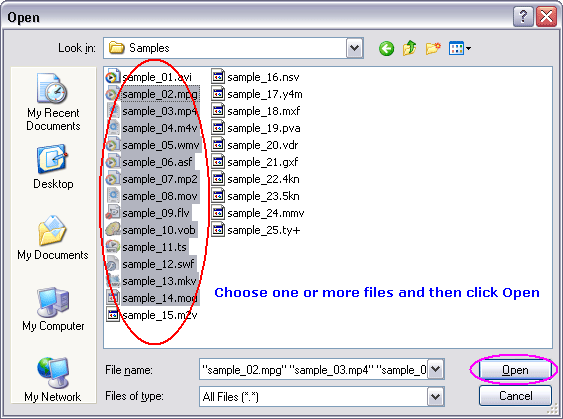 Choose one or more MLP files you want to convert and then click "Open". OGG Video Converter will open the files and get information such as width, height, frame rate, video bit rate, audio sample rate, audio bit rate, audio channels, and then list the information at conversion list. 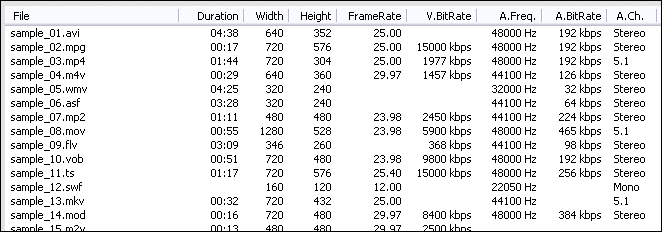
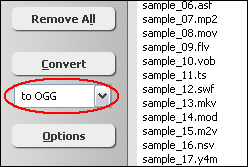
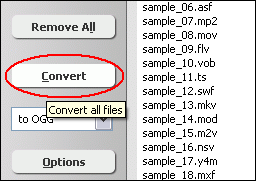 Click "Convert" to convert MLP files to OGG format.  The software is converting MLP files to OGG format. 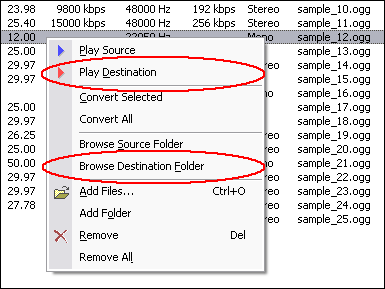 Right-click converted WMA file and choose "Play Destination" to play the outputted WMA file; choose "Browse Destination Folder" to open Windows Explorer to browse the WMA file. What is MLP? The MLP is used by Meridian codec. Audio compression used on DVD video discs. MLP performs lossless compression of up to 63 audio channels including 24-bit material sampled at rates as high as 192kHz. Lossless compression has many applications in the recording and distribution of audio. In designing MLP we have paid a lot of attention to the application of lossless compression to data-rate-limited ransmission (e.g. storage on DVD), to the option of constant data rate in the compressed domain and to aspects that impact on mastering and authoring. MLP was targeted to provide:
MLP provides for up to 63 channels, but applications tend to be limited by the available data rate. To aid compatibility, MLP uses a hierarchical stream structure containing multiple substreams and hierarchical additional data. With this stream structure decoders need only access part of the stream to playback subsets of the audio. Suitable use of the substreams also allows 2-channel compatibility; a low-complexity decoder can recover a stereo mix from a multichannel stream. Figure 1 gives an overview of the process of losslessly compressing a stream containing multiple audio channels and auxiliary data onto a disc. What is OGG? The name "Ogg" refers to the file format which can multiplex a number of separate independent free and open source codecs for audio, video, text (such as subtitles), and metadata. In the Ogg multimedia framework, Theora provides a lossy video layer, while the music-oriented Vorbis codec most commonly acts as the audio layer. The human speech compression codec Speex, lossless audio compression codec FLAC, and OggPCM may also act as audio layers. The term "Ogg" is commonly used to refer to audio file format Ogg Vorbis, that is, Vorbis-encoded audio in the Ogg container. Previously, the .ogg file extension was used for any content distributed within Ogg, but as of 2007, the Xiph.Org Foundation requests that .ogg be used only for Vorbis due to backward compatibility concerns. The Xiph.Org Foundation decided to create a new set of file extensions and media types to describe different types of content such as .oga for audio only files, .ogv for video with or without sound (including Theora), and .ogx for applications. Because the format is free, and its reference implementation is non-copylefted, Ogg's various codecs have been incorporated into a number of different free and proprietary media players, both commercial and non-commercial, as well as portable media players and GPS receivers from different manufacturers. Convert MLP to OGG Related Topics: EAC3 to OGG, H263 to OGG, OGA to OGG, PSX to OGG, EVOB to OGG, SMK to OGG, OGV to OGG, QT to OGG, EVO to OGG, H261 to OGG, DNXHD to OGG, QCP to OGG, SWF to OGG, AVI to OGG, HDTV to OGG, MPA to OGG, XA to OGG, MP1 to OGG, MP2 to OGG, VQF to OGG, THD to OGG, RPL to OGG, DVR-MS to OGG, DVD to OGG, MTS to OGG, VOB to OGG, MPG to OGG, VCD to OGG, NSV to OGG, M2V to OGG
|
| Home | Getting Started | Download | Buy Now! | Screen Shots | FAQ | Support | Contact | Links |
| Copyright © 2007-2014 Hoo Technologies All rights reserved. Privacy Policy |